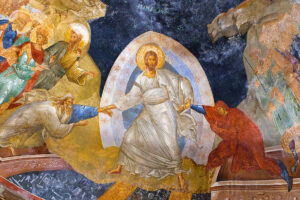Today’s Zaman newspaper recently reported on ‘Being crucified in Turkey’
Today’s Zaman is one of two English-language dailies based in Turkey and reports on domestic and international coverage.
The published article can be read in its entirety below.
Being crucified in Turkey
By Bulent Kenes, Columnist
12/23/2009
Read this article on the website of Today’s Zaman.
Greek Orthodox Patriarch Bartholomew’s interview on US-based CBS’ “60 Minutes” aired the other day on the occasion of Christmas week despite being taped months ago and has created quite a stir.
In the program, during which the problems of the Christian minority living in Turkey were also examined, Patriarch Bartholomew was asked whether he “sometimes feared that the community will be wiped out,” to which he replied: “Not really. We survived. We do believe in miracles. This is the continuation of Jerusalem. And for us, it is equally a holy and sacred land. We prefer to stay here, even crucified sometimes.” His usage of the word crucified has drawn the ire of both official agencies and unofficial observers in Turkey.
The term crucifixion, of course, doesn’t sound very pleasant. But how true would it be to say that the term can’t be applied to the situation in Turkey? I personally think that it ill suits a democratic country that claims to be secular that the Greek Orthodox Patriarchate — viewed as ecumenical by 300 million people, but in Turkey officially seen as a religious department within the Eyup district — suffers so many troubles. But it’s also necessary to add immediately that the idea that the problems of the Christian minority in Turkey are attributable to pressure from the Muslim majority as suggested by the CBS program’s extreme emphases is not at all true. Yes, it’s true that 99 percent of Turkey’s population is Muslim, but the troubles experienced by religious minorities, including Orthodox adherents, are, like the troubles experienced by the religious Muslim majority, entirely a result of the strict understanding of secularism in this country, unparalleled in the world.
It seems rather understandable to me, as an ordinary Turkish citizen, that if it is possible for Muslim Turks to feel “crucified” at the hands of the bureaucratic state dominated by elitist circles, then the leader of a religious minority whose numbers decrease every day must experience this agonizing feeling much more deeply. However, it’s necessary to correctly identify the reasons and the actors behind the conditions that create this feeling of “crucifixion.” This is the point at which I diverge from the esteemed patriarch. The patriarch probably wanted to make the issue easier to understand for the American public when he indicated the government as the reason behind the troubles facing his community. But as he himself well knows, the problems faced by minorities exist despite the current administration’s goodwill and efforts to rectify the state of affairs, arising instead from the armed and unarmed bureaucracy constituting the status quo and this bureaucracy’s extensions to be found within the judiciary, politics and the media.
Some nationalist circles have been unnerved by the patriarch and also CBS’ presentation of the news piece. And there are certainly discomfiting segments in the program such as those suggesting that Anatolia actually belongs to the Christians. But isn’t it true that Christian property has been confiscated in this country? Isn’t it a reality that we have to face up to the fact that churches, monasteries and schools have been shut down here? Aren’t the monasteries and clerical schools that were shut down in the 1970s still closed? How possible is it, really, to say that in a nation where the skewed understanding of secularism reigns, that the Christian minority has no problems when it even creates difficulties for quite a few religious Muslims, forcing some to go to European nations for their education?
The news piece in question says: “Fast forward a few centuries, and it’s hard to find Christians in Istanbul. One local church ’60 Minutes’ visited holds 500 people, but during its Sunday service, its pews were practically empty. It was the same everywhere we went. At the turn of the last century there were nearly 2 million Orthodox Christians in Turkey; 1.5 million were expelled in 1923 and another 150,000 left after violent anti-Christian riots in Istanbul in 1955. Today, in all of Turkey, there are only 4,000 Orthodox Christians left.” What part of this is a lie? What part of this is wrong?
It’s impossible not to agree with the opinion that, given Patriarch Bartholomew’s explanation that their church isn’t able to train new priests and that according to Turkish law, any future patriarch that takes his place must be born in Turkey, this is something akin to shutting down the College of Cardinals in Rome. It’s impossible not to agree entirely with his words: “It’s a pity and a shame. It’s a crime to keep such a school closed, unused, for no reason.”







